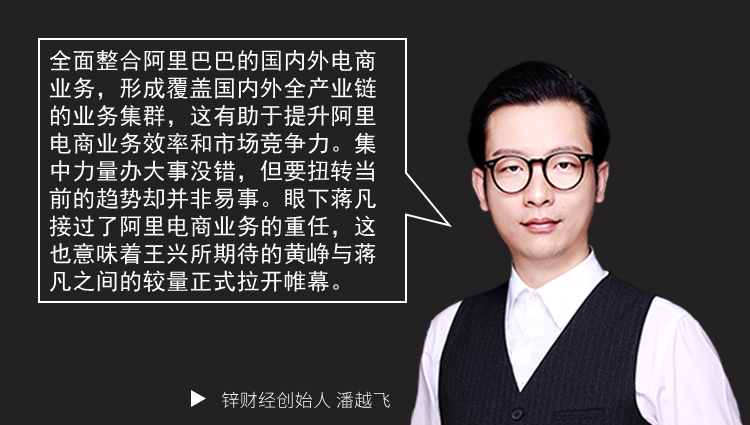Internal and External Unity, Jiang Fan Regains Power
![]() 11/27 2024
11/27 2024
![]() 513
513
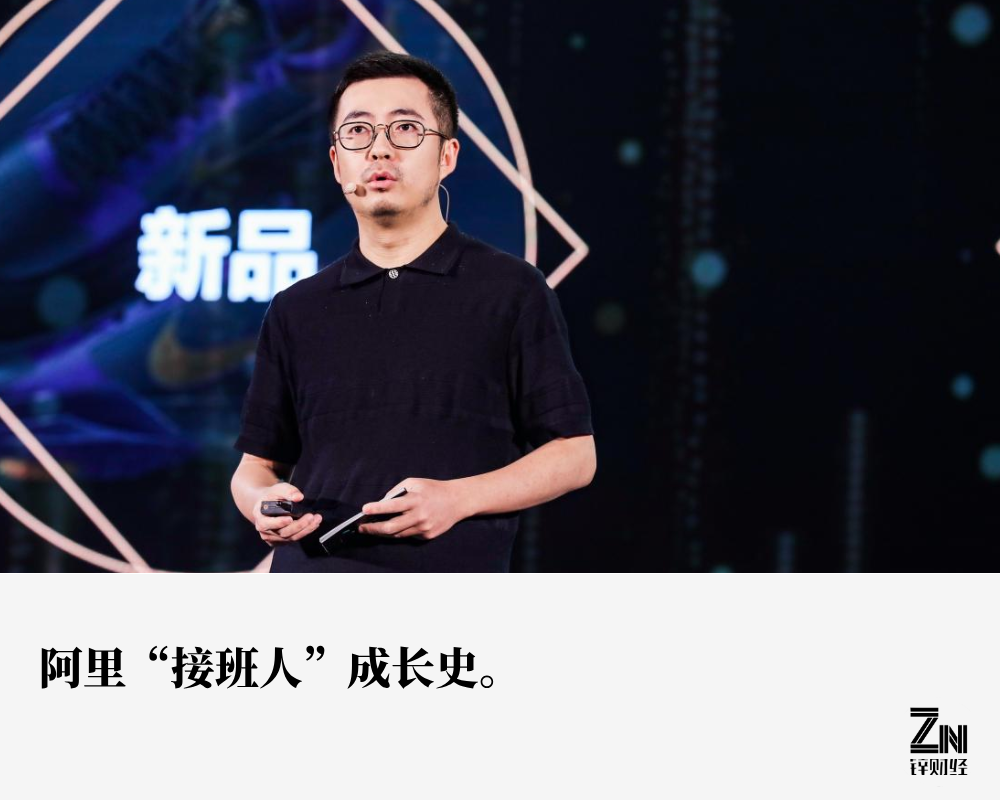
Author|Lu Shiming
Editor|Da Feng
After completing three years of rectification, Alibaba's wave of change is still surging. Recently, Alibaba Group announced a major personnel change: the establishment of the Alibaba E-commerce Business Group, fully integrating Taobao, Tmall, Alibaba International Digital Commerce Group, as well as e-commerce businesses such as 1688 and Xianyu, forming a business cluster covering the entire industry chain at home and abroad. Notably, Jiang Fan was appointed as the CEO of the E-commerce Business Group, returning to the center of power at Alibaba.
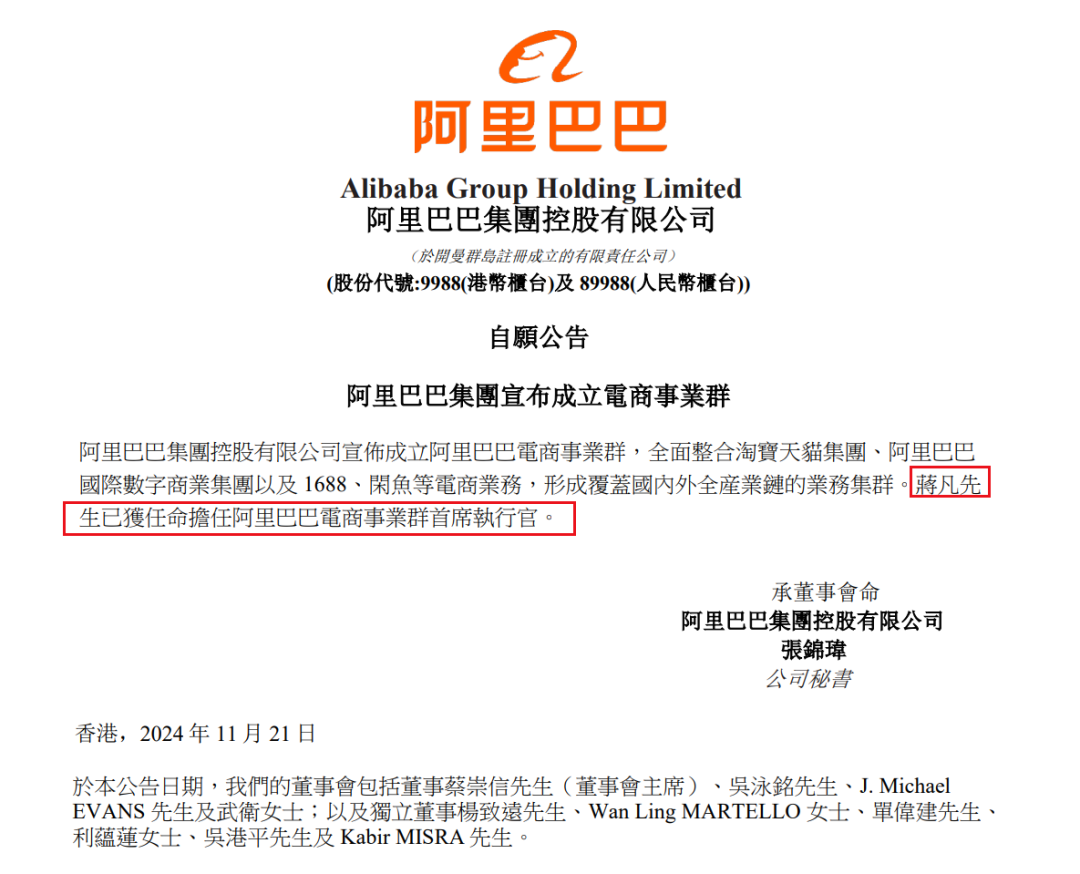
Source: Alibaba Announcement
Jiang Fan's return is not only an important turning point in his personal career but also reflects the deeper meaning of Alibaba's strategic adjustment.
It is evident that over the past few years, with intensifying market competition and ever-changing consumer demands, Alibaba's e-commerce business has faced increasing challenges. JD.com, Pinduoduo, Douyin, and Kuaishou have all gradually eroded Alibaba's e-commerce market share. To maintain its leading position and achieve sustainable development, Alibaba must make strategic adjustments and innovative changes. By integrating domestic and international e-commerce businesses, deepening e-commerce operations, and expanding into new business areas, Alibaba aims to create a more coordinated and efficient business cluster and a more flexible and innovative organizational mechanism. Jiang Fan's return is a crucial part of this strategic adjustment. The question is, is Jiang Fan, who bears the labels of "Alibaba's Youngest Partner" and "Alibaba's Successor," ready? Does he possess the personal ability to lead Alibaba to stop its decline and stabilize?
01 Return to the Core
Jiang Fan's return seemed to be foreshadowed. In March last year, Jiang Fan took on the role of CEO of the International Digital Commerce Group during Alibaba's largest-ever transformation. In May, he began appearing on earnings calls to discuss international business developments. By July, Alibaba Group released its fiscal 2023 annual report, which drew attention to changes among its partners. Besides Wan Lin, CEO of Cainiao, being a new partner, Jiang Fan was also listed, signifying his return to Alibaba's core. As Jiang Fan gradually returned to the core, Alibaba's senior management also underwent significant changes. In June 2023, Daniel Zhang, then Chairman and CEO of Alibaba Group Holding, announced his resignation as CEO in September, with Joseph Tsai, Executive Vice Chairman of the Group, taking over as Chairman, and Wu Yongming appointed as the new Group CEO. This series of senior management changes was essentially Alibaba's continuous reflection and rectification of the "big company disease."
With nearly 200,000 employees, Alibaba's sheer size inevitably led to organizational redundancy and decision-making delays, necessitating a restoration of focus and market adaptability. At the same time, Alibaba faced fierce competition. Especially Pinduoduo, whose market value surpassed Alibaba's last year. This incident not only sparked discussion within Alibaba but also attracted Jack Ma's attention. Subsequently, Alibaba's adjustment pace did not stop. In September last year, Wu Yongming clarified the strategic focus of "User First, AI-Driven," making strategic choices, focusing on core businesses, and concurrently serving as CEO of Tmall Group and Alibaba Cloud Intelligence Group, promoting the youthfulness of the management team and making drastic reforms to the organizational structure and business strategies. By December last year, Dai Shan resigned from relevant positions, while Wu Yongming took on the heavy responsibilities of CEO for Alibaba, Tmall Group, and Alibaba Cloud Intelligence Group. Shortly after, Wu Yongming announced a new round of organizational adjustments for Tmall Group, with a younger management team taking over comprehensively, including six young leaders like Wu Jia, appointed as heads of key businesses. These measures not only injected new vitality into Tmall Group's future development but also laid a solid foundation for Jiang Fan's reinstatement.

It is worth mentioning that Jiang Fan, born in the late 1980s, was once one of the youngest managers in Alibaba's senior leadership and the only executive among Alibaba's younger generation to oversee both domestic and overseas e-commerce businesses. These advantages almost made him the most suitable candidate to lead Alibaba's E-commerce Business Group. Of course, compared to being "young," Jiang Fan's personal abilities are undoubtedly the most crucial aspect.
02 Alibaba's Successor
Compared to other internet giant executives, little information about Jiang Fan's early background is available online. The earliest record dates back to 2002 and 2003 when, as an outstanding representative of Urumqi No. 1 High School, Jiang Fan won first and second prizes at the National High School Olympiad in Informatics and was guaranteed admission to the Department of Computer Science at Fudan University. Four years later, upon graduating from university, Jiang Fan entered the workplace and joined Google China, becoming a colleague of Huang Zheng. In 2010, with the closure of Google China's operations, Jiang Fan left Google and subsequently joined Innovation Works founded by Kai-Fu Lee. With Lee's support, Jiang Fan founded Umeng, a company specializing in providing data analysis services for mobile apps.
At that time, the mobile internet was booming, with a surge in mobile developers and app numbers. Consequently, within just three years, Umeng quickly covered nearly 600 million active devices, serving 180,000 apps and 60,000 developers, accumulating vast amounts of mobile internet application data. In 2013, Alibaba acquired Umeng for $80 million, and the 28-year-old Jiang Fan joined Alibaba, achieving financial freedom through the substantial proceeds. Jiang Fan, who originally planned to stay at Alibaba briefly, was moved by Daniel Zhang's heartfelt words.
Regarding what Zhang specifically said, it was probably similar to what Steve Jobs said to John Sculley: "Do you want to sell sugar water for the rest of your life, or do you want to come with me and change the world?" The power of dreams is always infinite. Jiang Fan, in his twenties, began to devote himself wholeheartedly to Alibaba. When Jiang Fan first joined Alibaba, the company's strategy was to focus on wireless, transitioning from desktop to mobile apps. With his rich experience in mobile apps, the 29-year-old Jiang Fan was appointed as the head of the mobile Taobao app, taking on the mantle of reforming Taobao.
Jiang Fan did not disappoint Zhang Yong, and Zhang Yong's judgment was spot on. Under Jiang Fan and his team's efforts, the daily active users of the mobile Taobao app soared from 30 million to 110 million in just one year. After this battle, Jiang Fan became famous overnight at Alibaba. However, this was just the beginning. In 2016, Jiang Fan proposed the concept of "consumer media," transforming the mobile Taobao app into a platform rich in content and a strong community atmosphere. Once realized, the mobile Taobao app would no longer be just a low-frequency tool app that meets shopping needs but would transform into a high-frequency media app that users enjoy browsing and exploring in their free time. Subsequently, at the Taobao Maker Festival, Jiang Fan tried out the new model of "internet celebrity + e-commerce + live streaming" and achieved remarkable results.

Besides content, innovative features such as Taobao's personalized recommendation algorithm "Guess You Like" and intricate innovations like 3D home event venues and shared shopping carts were either created by Jiang Fan or strongly promoted by him. With his strong product capabilities and impressive data results, Jiang Fan embarked on his rise to power. In 2017, Jiang Fan became President of Taobao, completing the integration of Taobao.com and the mobile Taobao app. In 2019, Jiang Fan was promoted to Alibaba's youngest partner, concurrently serving as President of Tmall...
03 Conquering Southeast Asia
After joining Alibaba for six years, Jiang Fan, at just 34, successfully steered Taobao, Tmall, and Alimama. This achievement not only made Jiang Fan renowned within Alibaba but also garnered respect from external competitors. Wang Xing, the founder of Meituan, once stated that the industry's focus in the coming years would be on the collision between Huang Zheng of Pinduoduo and Jiang Fan of Taobao and Tmall, hinting that if Jiang Fan emerged victorious in the competition, he would undeniably be Alibaba's successor, an indirect affirmation of Jiang Fan's future leadership.
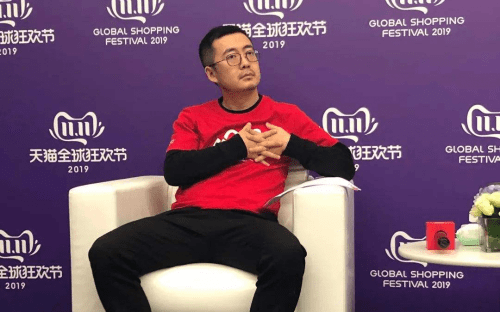
However, an accident occurred. In 2020, due to personal reasons, Jiang Fan was engulfed in a public uproar, losing his status as an Alibaba partner, his job level was downgraded from M7 to M6, and all rewards from the previous fiscal year were revoked. Although he retained his position as President of Taobao and Tmall, he virtually disappeared from the public eye. The only public news was that on December 23, 2020, the Hangzhou Municipal Human Resources and Social Security Bureau released a "Public Notice on Jiang Fan's Recognition as a High-Level Talent," which was suspended at the end of the month due to complaints from netizens. Of course, Alibaba could not forget this talent who had made tremendous contributions to its e-commerce business. After about a year of silence, Jiang Fan reemerged in the public eye, shouldering the heavy responsibility of Alibaba's overseas e-commerce business. At the end of December 2021, Alibaba established the "Overseas Digital Commerce" segment, with Jiang Fan, as the Group President, overseeing the global AliExpress and International Trade (ICBU) businesses, as well as multiple subsidiaries targeting overseas markets like Lazada. He concurrently resigned from his positions related to Taobao and Tmall.
At that time, the number of annual active consumers in Alibaba's overseas markets had reached 285 million, but there was still a significant gap compared to the ambitious goal of 1 billion overseas users. Meanwhile, the overseas market was a challenging "tough nut to crack," lacking unified traffic channels, product demand standards, language versions, payment systems, and logistics environments, facing uneven infrastructure conditions. On the other hand, competitors like Douyin and Tencent were actively deploying cross-border e-commerce and overseas businesses, intensifying market competition.
However, Jiang Fan once again proved his outstanding personal abilities. According to a previous report by "LatePost," shortly after taking over Alibaba's overseas e-commerce business, Jiang Fan quickly reorganized the business, establishing a structure comprising two domestic cross-border businesses (AliExpress, International Station) and four overseas local businesses (Lazada, Miravia, Trendyol, Daraz) and innovatively introducing various operating models such as full-service, semi-service, and self-operated.
In the nearly three years since Jiang Fan took over, the overseas business has become the fastest-growing segment within Alibaba Group. Alibaba Group's fiscal second-quarter 2025 earnings report (covering July 1 to September 30, 2024) showed that the Alibaba International Digital Commerce Group continued to lead with a 29% revenue growth rate, generating revenue of 31.672 billion yuan for the quarter. This strong performance was mainly driven by the growth of cross-border businesses, particularly the Choice business of AliExpress.
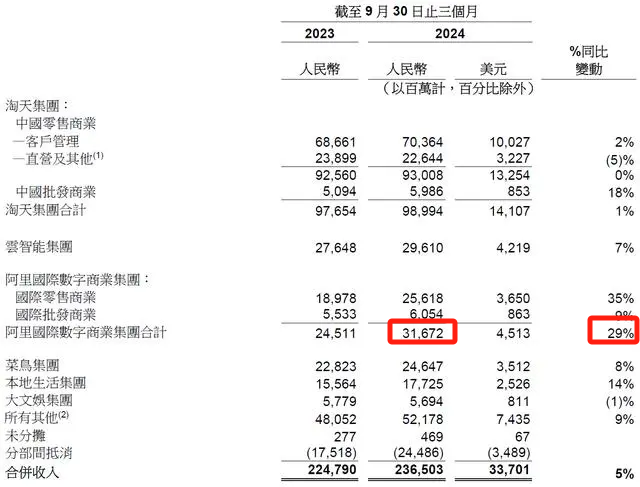
Source: Alibaba Interim Earnings Announcement
During this quarter, Alibaba's international business revenue scale was second only to Tmall Group's 99 billion yuan, slightly higher than Alibaba Cloud Intelligence Group's 29.6 billion yuan and Cainiao Group's 24.6 billion yuan, successfully becoming the Group's second-largest revenue pillar.
Although the overseas business is growing rapidly, the performance of domestic e-commerce platforms, including Taobao and Tmall, is somewhat lackluster, urgently needing to find a new path to break through the predicament. Facing a more complex and fiercely competitive domestic e-commerce market than in previous years, can Jiang Fan, upon his return to the stage, lead Alibaba's e-commerce business to a successful comeback and achieve self-"breakthrough" and "rebirth" amidst widespread discussions? We'll have to wait and see.
